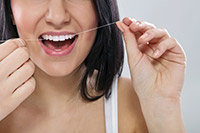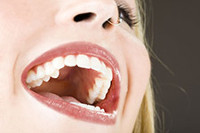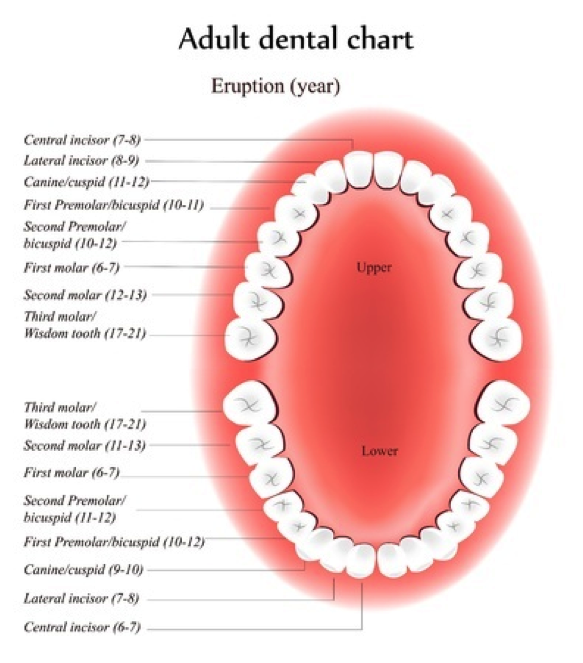Busting 9 Flossing Myths With Dental Facts
March 12th, 2015
 Many people are reluctant to floss, for one reason or another. However one convinces themselves, the reasons one avoids flossing is probably wrong. There are many myths about flossing that can easily be busted with a simple explanation. These are nine myths that tend to keep people from flossing, but should stop no one.
Many people are reluctant to floss, for one reason or another. However one convinces themselves, the reasons one avoids flossing is probably wrong. There are many myths about flossing that can easily be busted with a simple explanation. These are nine myths that tend to keep people from flossing, but should stop no one.
1. If My Gums Bleed I Should Stop Flossing
This is a big myth that can keep many people from flossing everyday. They think that they are hurting themselves by flossing, causing their gums to bleed. In fact, it’s the opposite. Your gums bleed because the bacteria growing between your teeth have inflamed your gums. If you floss daily and visit a dentist for cleanings, your gums will bleed less and less until the bacteria is cleared out and they stop bleeding altogether.
2. Flossing Will Loosen Fillings
Flossing is necessary with any kind of dental work, including fillings, crowns, veneers, bridges, and more. Dental work becomes necessary when one doesn’t floss enough. Any kind of dental work needs extra care. Flossing everyday is absolutely necessary.
3. I Cannot Floss With Braces
Though it may be harder to floss with braces, it is necessary. With braces, gums are more likely to become inflamed and infected.
4. I Cannot Floss Because My Teeth are Too Close Together
At Water Tower Dental Care, we can attest that we have never had a patient that has had teeth too close together to floss. Of course some teeth are closer than others and it can be difficult to floss. There is specific thinner floss that one can purchase to solve this issue, but from our experience, this is an excuse more than an actual problem.
5. Flossing Takes Too Much Time
Though some people may have busier mornings than others, there is always time to floss. You can floss in the morning, afternoon, or night—any time of the day. Proper flossing should take no more than two to three minutes. If someone doesn’t have two to three minutes to spare in their day, they may have bigger problems to deal with, though we doubt anyone is that busy.
6. A Waterpik Does the Same Job
Many think that a waterpik can take the place of flossing. Though a waterpik is a very useful tool, it cannot do as good of a job as floss. A waterpik should be used in conjunction with flossing, not as a replacement.
7. I Use Mouthwash Instead of Floss
Just like a waterpik, while mouthwash definitely helps, it is adjunct to floss. Mouthwash is better for loosening plaque, killing bacteria, and freshening breath, but it cannot take the place of floss.
8. There’s No Food In My Teeth, So I Don’t Need to Floss
First, food can be hard to detect in the far reaches of your teeth. Unless you have advanced mirror and lighting technologies to see far into the back reaches of your teeth, it is impossible to say if there’s food between your teeth. More importantly, floss does not just remove food from your teeth, it also helps remove plaque that is built up between them. This plaque is what can cause gum disease and cavities. It is the main reason you floss.
9. Flossing Is Not Fun
Though you may not find it fun at first, flossing will become a rewarding and pleasurable experience the more you do it. You will become more used to the process, and it will feel good to make the space between your teeth clean and smooth.

 It’s a surprise at how little many people think about their teeth until a true problem arises. Teeth are often ignored and given little care until it’s too late. The best thing a person can do for their teeth is to educate themselves on the proper care as well as their simple structure. Many people don’t even realize they have several different types of teeth. Today, we’d like to help our readers by listing the different types of teeth and how they help you every day.
It’s a surprise at how little many people think about their teeth until a true problem arises. Teeth are often ignored and given little care until it’s too late. The best thing a person can do for their teeth is to educate themselves on the proper care as well as their simple structure. Many people don’t even realize they have several different types of teeth. Today, we’d like to help our readers by listing the different types of teeth and how they help you every day.
 Bad breath doesn’t just ruin dates. It can also be a problem that embarrasses you every time you open your mouth to talk to someone. Worst of all, a surprising number of people suffer from bad breath, even if they practice proper oral hygiene.
Bad breath doesn’t just ruin dates. It can also be a problem that embarrasses you every time you open your mouth to talk to someone. Worst of all, a surprising number of people suffer from bad breath, even if they practice proper oral hygiene. When the word cosmetic is used, most people immediately think of vanity, and changing your appearance for aesthetic reasons, rather than functional ones. However, when it comes to cosmetic veneers, there are many helpful reasons why one would want them, other than cosmetic reasons. Here’s how cosmetic veneers can do more than give you a better-looking smile.
When the word cosmetic is used, most people immediately think of vanity, and changing your appearance for aesthetic reasons, rather than functional ones. However, when it comes to cosmetic veneers, there are many helpful reasons why one would want them, other than cosmetic reasons. Here’s how cosmetic veneers can do more than give you a better-looking smile.





 Website Powered by Sesame 24-7™
Website Powered by Sesame 24-7™